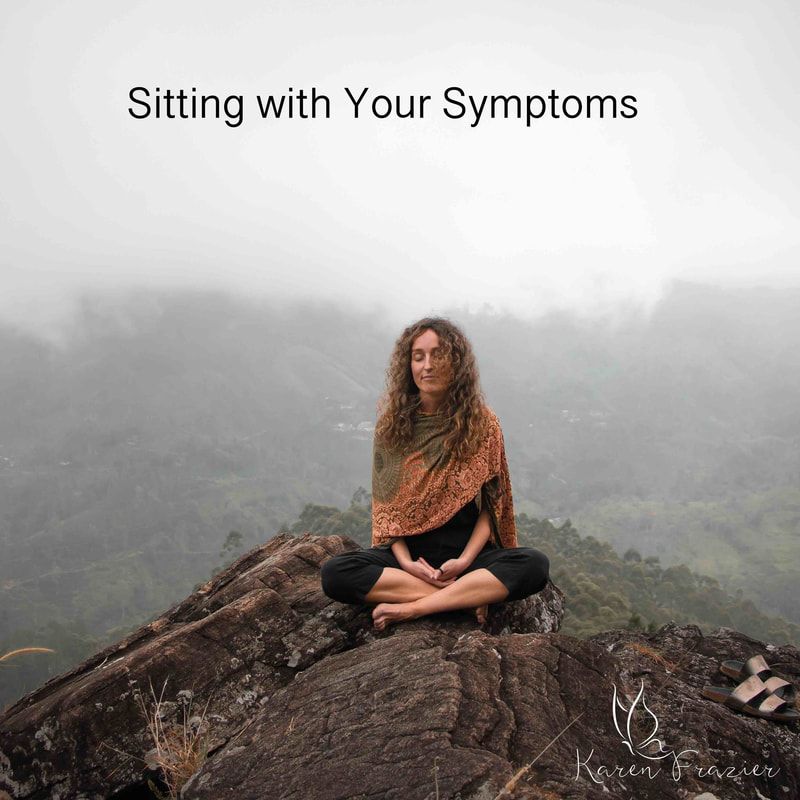|
I woke up this morning at 3 AM with tightness in my chest, a a cough, and congestion. Given it's cold and flu season, it doesn't take much for me to understand what's happening in my body physiologically, and it's easy to reach for the nearest symptom relieving medication so my body's signals don't bother me as I go throughout my day.
It has been my solution for years; take care of the symptoms so I can power through. In the Western world, this is often how we deal with physical discomfort - a.k.a. symptoms. We ignore the invitation for rest and contemplation they provide and instead go straight for suppression because having symptoms during our busy lives just feels so darn inconvenient. I came into adulthood in the 1980s when the motto was, "No pain, no gain," and I took that crap seriously. No matter what my body signaled, I powered through it either ignoring or suppressing any symptom that arose. Perhaps not surprisingly, the messages from my body grew louder and more intense until my first chronic illness entered my life: Hashimoto's thyroiditis. That was my body sending messages loud and clear to me, and yet I continued for a few more decades to power through until I discovered a kinder approach. Even today, powering through is my first instinct, arising from my ego which loudly proclaims, "Show no weakness! Pain is for wimps!" In Ayurveda, there is a principle called samprapti, which describes six stages in the progression of disease. Each stage progresses from the one before it, offering you the opportunity to heed a signal (symptom) before it becomes systemic. Ayurveda focuses on doshas, or forces, comprised of the five elements. These dohas, Vata (air and space or ether), Pitta (fire and water), and Kapha (earth and water) must be in balance for emotional, physical, mental, and spiritual health to be optimal. When imbalance between the elements occurs, it first shows as a symptom. If the imbalance is ignored instead of addressed, then the progression of disease begins. These six stages include:
Therefore, it's in our best interests that, instead of powering through, we accept our body's invitation to bring it back into balance when the first symptom, no matter how mild, arises. When you have a symptom (physical, emotional, mental, or spiritual), no matter how mild it is, your body is issuing you an invitation. It's alerting you to an imbalance that is present and inviting you to discover how and why it has occurred. During these times, the best thing you can do for yourself is to take a moment to sit quietly with the symptom instead of ignoring it and forging ahead with your day. Close your eyes for a moment, focus on the symptom, and ask, "What is it you are trying to tell me?" Then, breathe deeply, empty your mind, and listen. Your innate intelligence will tell you what you need to do to return to balance because your body, mind, and spirit always seek to return to a harmonious state before imbalances can set in, get stuck in your body, and manifest as illness. BJ Palmer, the son of the father of chiropractic Daniel David Palmer said, "The power that made the body heals the body." In other words, your body has an innate intelligence to return to balance and wellness if you remove the forces that are causing its dis-ease. And sitting with discomfort of any type (mental, physical, emotional, spiritual) as soon as it arises allows you to listen to the invitation being issued in order to address an imbalance long before it ever has the opportunity to progress into something catastrophic you can't ignore so your body, mind, and spirit can return to a place of optimal wellness through its own innate intelligence. And so I laid in bed at 3 AM, with my eyes closed and my Reiki hands resting over the area of tightness in my lungs. I listened to my body's invitation for balance, and I listened to what it told me was out of balance. I breathed deeply and allowed my mind to go where it needed to in order to release emotions that had stuck in my chest. I didn't try to suppress the discomfort. Instead, I moved into it and allowed it with all of the attendant thoughts, emotions, and beliefs that came with it. If the symptoms arise again, I'll need to do it again, sitting with my mental, emotional, spiritual, and physical symptoms alerting me to the opportunity to recognize imbalance and release it so my body, mind, and spirit can heal themselves. Image by Bhikku Amitha from Pixabay
1 Comment
|
Categories
All
Archives
December 2022
|
AUTHOR KAREN FRAZIER
- Home
-
Books
- Angel Numbers for Beginners
- Avalanche of Spirits
- Chakra Crystals
- Complete Reiki
- Crystal Alchemist
- Crystals for Beginners
- Crystals for Healing
- Dancing with the Afterlife
- Dream Interpretation Handbook
- Essential Crystal Meditation
- Higher Vibes Toolbox
- Introduction to Crystal Grids
- Little Book of Energy Healing Techniques
- Noisy Ghosts
- Reiki Healing for Beginners
- Transform Your Life with Alchemy
- Ultimate Guide to Psychic Ability
- Usui Ryoho Reiki Manual
- Cookbooks
- Other Books
- Classes
- Connect
- Meditate

 RSS Feed
RSS Feed
